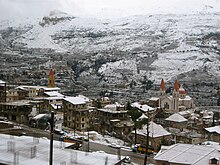Bisharri
|
Bisharri بشري |
||

|
||
| State : |
|
|
| Governorate : | North Lebanon | |
| District: | Bisharri | |
| Coordinates : | 34 ° 15 ′ N , 36 ° 1 ′ E | |
| Time zone : | UTC + 2 | |
|
|
||
Bischarri (other spellings: Bsharri , Becharré , Bcharré , Bsharre ; Arabic بشري Bischarrī ) is the capital of the district of the same name in Lebanon , about 1450 m above sea level above the Wadi Qadischa . The place is located in the northern part of the Lebanon Mountains . Bisharri is the birthplace of the poet, painter and sculptor Khalil Gibran .
history
Bisharri lies on the site of an ancient Phoenician settlement . Maronites , who fled the persecution, settled here in the 7th century. The Wadi Qadisha, which lies below the city, became the spiritual center of the Maronite Church. At the time of the Crusades , the city was known as Buissera. In contrast to other parts of Lebanon, the Aramaic language was spoken in Bisharri well into the 19th century. For this reason, the accent of the locals is unmistakable to this day. During the Lebanese civil war , Bisharri was a bastion of Christian resistance against left and Islamist forces. Samir Geagea , who comes from Bisharri, became chairman of the Christian movement Forces Libanaises (FL) in 1986 . Today the city is located in an area with a number of tourist destinations, including a. the tomb of Gibran and his museum, the Wadi Qadischa with the " Cedars of the Lord " and the ski area Les Cèdres.
Personalities
- Anton Peter Arida (1863–1955), Lebanese Archbishop and Patriarch of Antioch
- Khalil Gibran (1883–1931), Lebanese-American painter, philosopher and poet

